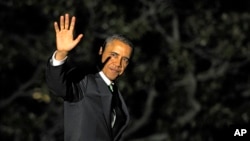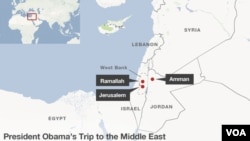JERUSALEM —
U.S. President Barack Obama has arrived in Israel, the fifth visit of a U.S. president since Israel's founding. There is an atmosphere of anticipation, but also realism among Israelis and Palestinians about what may be accomplished.
Israel
-Will meet with Israeli Prime Minister Benjamin Netanyahu
-Plans to visit Israel's Holocaust memorial and the grave of Yitzhak Rabin
-Will deliver speech to Israeli students
West Bank
-Will meet in Ramallah with Palestinian President Mahmoud Abbas and Prime Minister Salam Fayyad
-Plans to visit Bethlehem's Church of the Nativity
Jordan
-Will meet with King Abdullah
-Plans to visit Petra
Israel is ready for Obama. Thousands of American and Israeli flags adorn lampposts in Jerusalem. About 5,000 Israeli police are involved in ensuring security during each day of the presidential visit.
At Tel Aviv's Ben Gurion Airport, the president will get a full ceremonial welcome and will deliver remarks with Prime Minister Benjamin Netanyahu and President Shimon Peres.
Obama also will inspect anti-missile systems and associated radar technology developed with hundreds of millions of dollars in U.S. support.
It's then on to Jerusalem, where the three leaders will hold talks and Obama and Prime Minister Netanyahu will make statements.
Obama's visit comes amid continuing skepticism among Israelis about his commitment to Israel's security, especially in the face of threats from Iran, and despite his numerous pledges that he "has Israel's back."
A poll conducted by the Israel Democracy Institute and Tel Aviv University found 36 percent of Israeli Jews view him as friendly toward Israel, a several percentage point increase from a year ago.
Obama addressed such skepticism during a news conference in 2012.
"The measure of my commitment to Israel is seen in the actions that I have taken as president of the United States, and it is indisputable that I have had Israel's back over the last three years," said President Obama.
The president's talks with Israeli leaders will focus on a range of issues, but notably the threat Israel faces from Iran's nuclear program, and the situation in Syria.
The Assad government in Syria and rebels exchanged accusations Tuesday about alleged chemical weapons use, something Obama has said would cross a so-called U.S. red line.
White House spokesman Jay Carney said the matter is certain to be high on the agenda throughout Obama's Mideast trip.
"I have no doubt that Prime Minister Netanyahu and the president will discuss it, President Shimon Peres and the president will discuss it as well, and it will be a topic, I’m sure, in discussions with other leaders - the king of Jordan, as well as the Palestinian leader," said Carney.
On the Israel-Palestinian conflict, White House officials say Obama will listen to both sides and assess possible steps that could be taken to re-start direct talks.
Obama meets Palestinian President Mahmoud Abbas on Thursday in Ramallah in the occupied West Bank.
The same Israel Democracy Institute Poll found 62 percent of Jewish Israelis believe Obama will be unable to achieve any breakthrough on the Israel-Palestinian conflict.
President Obama's Mideast Trip
President Obama's Mideast TripIsrael
-Will meet with Israeli Prime Minister Benjamin Netanyahu
-Plans to visit Israel's Holocaust memorial and the grave of Yitzhak Rabin
-Will deliver speech to Israeli students
West Bank
-Will meet in Ramallah with Palestinian President Mahmoud Abbas and Prime Minister Salam Fayyad
-Plans to visit Bethlehem's Church of the Nativity
Jordan
-Will meet with King Abdullah
-Plans to visit Petra
At Tel Aviv's Ben Gurion Airport, the president will get a full ceremonial welcome and will deliver remarks with Prime Minister Benjamin Netanyahu and President Shimon Peres.
Obama also will inspect anti-missile systems and associated radar technology developed with hundreds of millions of dollars in U.S. support.
It's then on to Jerusalem, where the three leaders will hold talks and Obama and Prime Minister Netanyahu will make statements.
Obama's visit comes amid continuing skepticism among Israelis about his commitment to Israel's security, especially in the face of threats from Iran, and despite his numerous pledges that he "has Israel's back."
A poll conducted by the Israel Democracy Institute and Tel Aviv University found 36 percent of Israeli Jews view him as friendly toward Israel, a several percentage point increase from a year ago.
Obama addressed such skepticism during a news conference in 2012.
"The measure of my commitment to Israel is seen in the actions that I have taken as president of the United States, and it is indisputable that I have had Israel's back over the last three years," said President Obama.
The president's talks with Israeli leaders will focus on a range of issues, but notably the threat Israel faces from Iran's nuclear program, and the situation in Syria.
The Assad government in Syria and rebels exchanged accusations Tuesday about alleged chemical weapons use, something Obama has said would cross a so-called U.S. red line.
White House spokesman Jay Carney said the matter is certain to be high on the agenda throughout Obama's Mideast trip.
"I have no doubt that Prime Minister Netanyahu and the president will discuss it, President Shimon Peres and the president will discuss it as well, and it will be a topic, I’m sure, in discussions with other leaders - the king of Jordan, as well as the Palestinian leader," said Carney.
On the Israel-Palestinian conflict, White House officials say Obama will listen to both sides and assess possible steps that could be taken to re-start direct talks.
Obama meets Palestinian President Mahmoud Abbas on Thursday in Ramallah in the occupied West Bank.
The same Israel Democracy Institute Poll found 62 percent of Jewish Israelis believe Obama will be unable to achieve any breakthrough on the Israel-Palestinian conflict.








